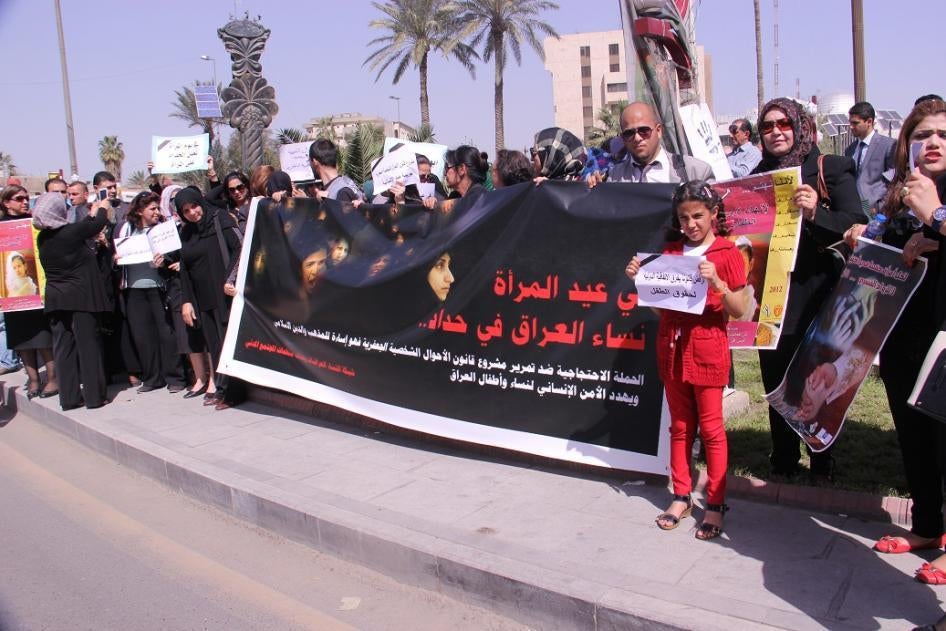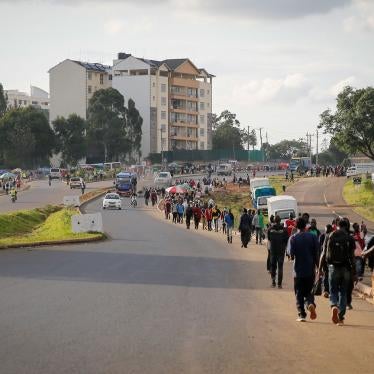(Beirut) –The death on April 18 of a 20-year-old woman in Najaf, possibly at the hands of her husband, should act as a wake-up call for Iraqi legislators to pass a law against domestic violence, Human Rights Watch said today. Iraqi authorities should investigate and prosecute domestic violence, and ensure appropriate sentences for violence against women.
“Domestic violence has always plagued Iraq,” said Belkis Wille, senior crisis and conflict researcher at Human Rights Watch. “We see case upon case of women and girls dying at the hands of their families, but Iraq's lawmakers have not done enough to save those lives.”
On April 12, a video surfaced on social media of the woman in a hospital with severe burn wounds. Her mother told Human Rights Watch that eight months ago her daughter married a police officer who had only allowed her to visit her parents once since then. On April 8, her mother said, the husband called to tell her that his wife had a “slight burn accident” and was in the hospital.
The mother could hear her daughter screaming. She rushed to the hospital, where the husband’s mother blocked her from seeing her daughter. Police took the young woman’s statement while her mother was blocked from the room, the mother said. On April 11, when she was able to enter the hospital room, her daughter told her that her husband had beaten her so badly on April 8 that she poured gasoline on herself and warned him that unless he stopped, she would light herself on fire.
“I still don’t know if he lit her on fire or she did it herself, but she told me she burned for three minutes while he just watched, and finally his father, also a policeman, came in and put out the fire,” the mother said. “She begged them to take her to the hospital but they waited for over an hour before doing so. Her father-in-law then pretended to the police that he was her father and said to them the fire had been an accident.”
The young woman died on April 18. Najaf’s governor, Loai al-Yasiri, told Human Rights Watch on April 15 that the authorities had established an investigation committee and arrested the husband, father-in-law, and the husband’s uncle. Al-Yasiri said that this case would likely be resolved through a mediation in which the husband’ family’s ashira (clan) would negotiate with Samira’s family’s ashira to reach a non-judicial settlement.
Domestic violence remains a serious problem in Iraq. The Iraq Family Health Survey (IFHS) of 2006/7 found that one in five Iraqi women are subject to physical domestic violence. A 2012 Planning Ministry study found that at least 36 percent of married women reported experiencing some form of psychological abuse from their husbands, 23 percent verbal abuse, 6 percent physical violence, and 9 percent sexual violence.
Thikra Sarsim, deputy director of Babel Tower, a Baghdad nongovernmental organization, told Human Rights Watch on the day that the young woman died: “She will not be the last one so long as the law does not protect women. My organization has documented many honor killings over the years, but the death certificates instead say ‘suicide.’”
While the Iraqi constitution expressly prohibits “all forms of violence and abuse in the family,” only the Kurdistan Region of Iraq has a law on domestic violence. Iraq’s criminal code, applicable in both Baghdad-controlled territory and the Kurdistan Region, criminalizes physical assault but lacks explicit mention of domestic violence. Instead, article 41(1) gives a husband a legal right to “punish” his wife, and parents to discipline their children “within limits prescribed by law or custom.” The penal code provides for mitigated sentences for violent acts, including murder, for “honorable motives” or for catching one’s wife or female relative in the act of adultery or sex outside of marriage.
Iraqi parliamentary efforts to pass a draft law against domestic violence stalled throughout 2019 and 2020. Wahda Jumaili, a member of the parliament’s human rights committee, told Human Rights Watch that some members blocked the law because they do not believe that the state should punish honor killings or parents’ corporal punishment of their children. Shatha Naji, head of the Women for Peace Organization, said one member of parliament told her, “Do you really want to make our society just like a Western one, where I cannot even punish my son if he comes home late?”
The 2019 version of the draft anti-domestic violence law seen by Human Rights Watch includes provisions for services for domestic violence survivors, protection (restraining) orders, penalties for their breach, and the establishment of a cross-ministerial committee to combat domestic violence. However, the bill has several gaps and provisions that would undermine its effectiveness.
One major problem is that the draft law prioritizes reconciliation over protection and justice for victims. Naji said that victims of domestic violence in Iraq rarely make criminal complaints via the police. Instead, the community police play a mediatory rather than a law enforcement role, and focus on reconciling victim and the abuser in line with community practices.
Iraq has few working shelters and domestic violence victims are often temporarily housed in female prisons. The 2019 draft law would establish government shelters in coordination with local women’s rights organizations. In October 2019, Human Rights Watch interviewed five Iraqi women living in a shelter who said they had fled their homes because of years of domestic violence, including rape and forced prostitution, by family members or their husband.
One 18-year-old woman told Human Rights Watch that her brother forced her to marry a friend of his at age 14. Her family, the police, and ultimately a local judge refused to help when she told them that her husband beat her and forced her into prostitution. She said that after she finally fled and went into hiding, her brother wanted to kill her. “[It is] normal in my family to kill someone - my grandfather killed his sister and my uncle killed his sister,” she said.
Measures to combat domestic violence are all the more urgent in the context of the Covid-19 pandemic. UN Women has warned that lockdowns can lead to higher rates of violence in the home, as evidenced by spikes in domestic violence around the world, including in Brazil, China, France, Kenya, Kyrgyzstan, South Africa, and the UK.
Speaking of Iraq, Naji, of the Women for Peace Organization said, “Now you might have three families living together, 20 people, all in one small home, and we have no adequate system to be monitoring the potential escalation of domestic violence cases because they aren’t being reported.”
In 2019, Human Rights Watch interviewed two migrant domestic workers who said that their employers routinely beat them and one said her employer raped her. Migrant domestic workers face particular risks, with police rarely protecting even those who try to make a criminal complaint.
Measures around the lockdown should include ensuring that domestic violence victims are not arrested when seeking assistance or escaping abuse. The authorities should immediately communicate zero tolerance for domestic violence and ensure that hotlines and other assistance is available to survivors, their neighbors, or families to report abuse. The authorities should also set procedures to intervene, and assist survivors by ensuring refuge or protection orders to expel abusers from their homes, Human Rights Watch said.
On April 9, President Barham Salih nominated Mustafa al-Kadhimi as prime minister-designate. Al-Kadhimi, is expected to present his cabinet to the parliament in late April. Iraq’s parliament, elected in September 2018, is still in office, though currently not meeting because of the pandemic.
When parliament resumes its sessions, it should urgently revise the draft law against domestic violence to ensure that it meets international standards and then pass it without delay, Human Rights Watch said. The government should meanwhile consult with local women’s rights organizations to open more shelters for survivors of domestic violence, and donor governments should fund private shelters for victims of domestic violence.
“It should not take a global pandemic for Iraqi legislators to address the other deadly pandemic of domestic violence, but failure to do so will cost more lives” Wille said.









